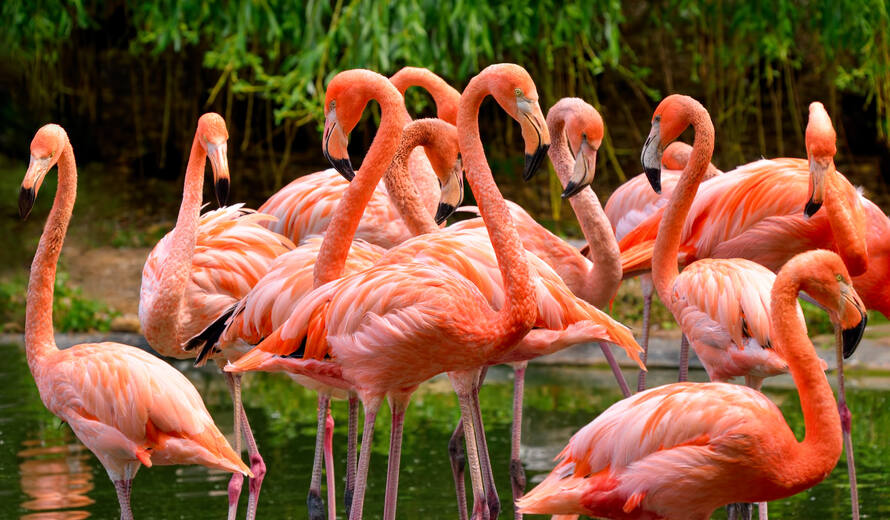Statement by the members of the Liaison Group of Biodiversity-related Conventions to IPBES-7
Today at UNESCO HQ in Paris, the Intergovernmental Science-Policy Platform on Biodiversity and Ecosystem Services (IPBES) opened its Seventh session. During the session the members of the Liaison Group of Biodiversity-related Conventions (including the eight Biodiversity-related Conventions, the CBD, the World Heritage Convention, CITES, CMS, the Ramsar Convention on Wetlands, IPPC, the Treaty on Plant Genetic Resources, and the International Whaling Commission) delivered the following statement:
Statement by the members of
the Liaison Group of
Biodiversity-related Conventions
To the Seventh session of the Plenary of the Intergovernmental Science-Policy Platform
on Biodiversity and Ecosystem Services (IPBES-7)
UNESCO Headquarters, Paris, France, 29 April 2019
Convention on Biological Diversity (CBD)
Thank you Chair,
Distinguished delegates, colleagues,
This statement is delivered on behalf of the eight Biodiversity-related Conventions, the CBD, the World Heritage Convention, CITES, CMS, the Ramsar Convention on Wetlands, IPPC, the Treaty on Plant Genetic Resources, and the International Whaling Commission.
Parties to our respective Conventions and the Secretariats have engaged in and benefitted from the work undertaken by IPBES. Since its establishment in 2012, we have seen IPBES rally experts to undertake challenging assessments, review and undertake work on models and scenarios, reflect on ways to draw in indigenous and local knowledge and build the capacities needed to better understand our natural environment and how our actions affect the delivery of the services provided by ecosystems – both positively and negatively.
In looking back at the processes and mechanisms established under IPBES as part of its first work programme, the work of its task forces and technical support units, the assessments and other deliverables have advanced our global knowledge of biodiversity and ecosystem services and enable our respective instruments to develop policies on the basis of a sound scientific basis.
Let me give just a few examples:
- The thematic assessment of pollinators, pollination and food production has had a significant impact, not only in the context of the CBD and its various decisions, but with regard to the global understanding and discourse on the critical role of insects and other pollinators in maintaining ecological processes and systems. It has resulted in follow-up studies and resulted in the development of a range of programmes, strategies and initiatives at local, national and international levels aimed to mitigate undesirable consequences of our agricultural production systems.
- The thematic assessment on the sustainable use of wild species, now underway, offers the prospect of significant new insights into this subject which should help the Parties to CITES and IWC, in particular, to reflect on the implementation of their conventions and the way that their work fits with the wider sustainability agenda.
- The thematic assessment of land degradation and restoration will help a number of multilateral environmental agreements to support coordinated policy agendas that encourage sustainable production and consumption, and provide a platform for action to avoid and reduce land degradation and promote restoration.
- The four regional assessments on biodiversity and ecosystem services provide a critical analysis of the state of knowledge regarding the importance, status, trends and threats to biodiversity and nature’s contributions to people as well as policy and management response options that are relevant for the biodiversity-related conventions. They have been presented to delegates in a number of workshops and side events in the context of the CBD and have led to significant debate and reflection on the suitability of existing policies and processes in sustaining a healthy planet for future generations.
The global assessment of biodiversity and ecosystem services that is being finalized at this meeting provides the latest data and information across the range or our respective mandates. Indeed, it will provide a key input for the discussion of the post-2020 global biodiversity framework, in which we are all engaged. We therefore look forward to this Plenary completing and approving the assessment so that we can make use of it in our respective Convention processes when relevant, and in our common work in developing a follow-up to the Strategic Plan for Biodiversity beyond 2020.
We have emphasized the value of the IPBES deliverables completed to date and also note a number of deliverables that are still in progress. We are pleased to note the decision from the last Plenary that these would be completed and very much look forward to being able to draw on these once completed and approved. At the same time, we have, both individually and in coordination, provided inputs to the rolling work programme envisaged from hereon. We are pleased to note that these inputs have been considered in developing the plans for the future. We look forward to contributing to the discussion on this agenda item. We hope that inputs which have been submitted by multiple treaties and whose results would benefit several processes will receive special attention in the Plenary’s deliberations. We expect the work programme to support the achievement of the post-2020 global biodiversity framework, and the 2050 vision, as well as other work under the conventions related to biodiversity.
Finally, Mr. Chair, in the context of the findings and recommendations of the Review of the Platform we look forward to stronger collaboration and alignment between IPBES and each of our Conventions, notably by taking into account priorities formally adopted by our respective decision-making bodies.
Thank you, Chair.
